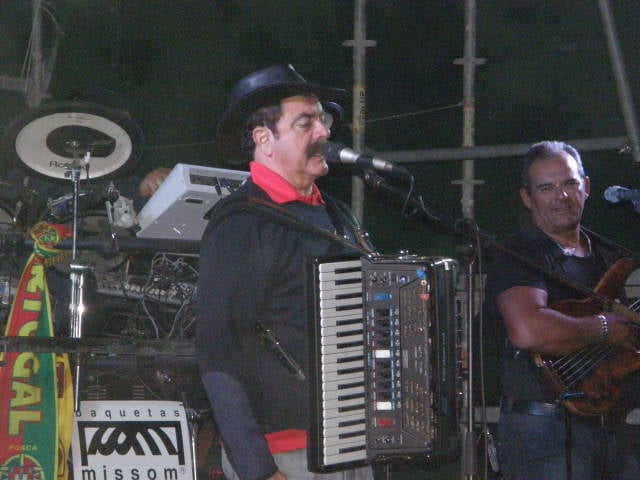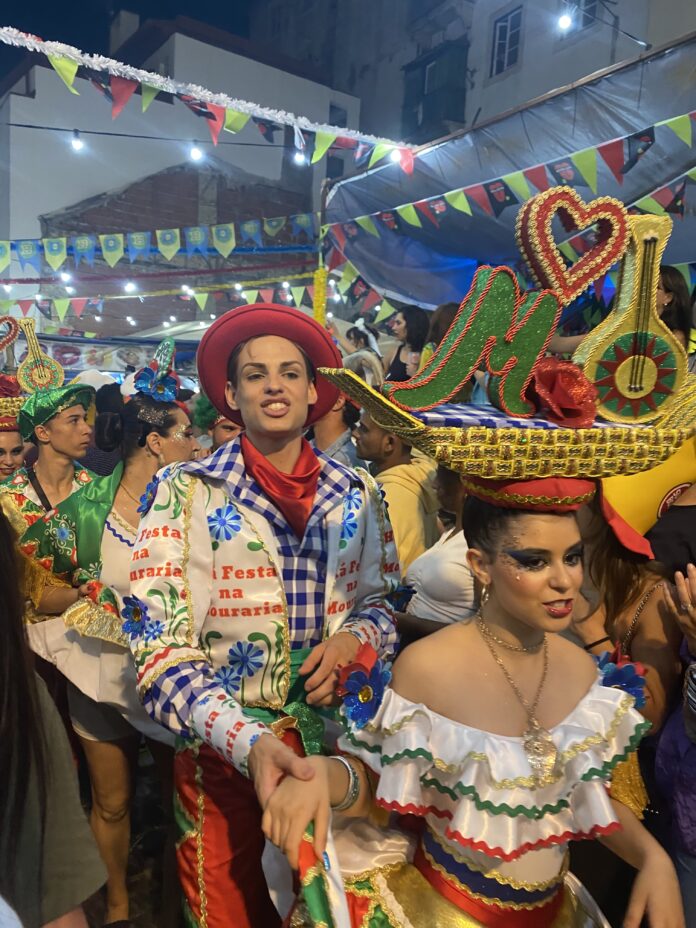You’ve heard of fado, Portugal’s expressive and melancholic music, but what about pimba? As playful as it is risqué, pimba is the energetic counterpoint to fado and one of the most popular types of music during the Santos Populares festivals held all over the country during the month of June. With its catchy melodies, simple lyrics, and a propensity for humorous and risqué content, pimba will fill your ears and your heart throughout the night during Santos Populares, so let’s learn more about it!
Origins and Characteristics
Pimba music originated in the 1980s and 1990s, drawing influences from traditional Portuguese folk music and popular styles such as fado and pop. The genre is often associated with working-class entertainment and is known for its accessibility and straightforwardness. The term “pimba” itself is said to derive from a popular exclamation used by Emanuel in his hit song “Pimba Pimba” released in 1995, which encapsulated the essence of this music style.
Musically, pimba is characterized by lively rhythms, repetitive melodies, and a significant use of accordion, synthesizers, and guitars. The lyrics often revolve around everyday themes, romantic escapades, and humorous situations, frequently employing double entendres and innuendos to add a playful and sometimes naughty twist.
Pimba and Santos Populares Festivals
The Santos Populares, or Popular Saints’ Festivals, held in honor of saints such as St. Anthony, St. John, and St. Peter, are vibrant street celebrations taking place throughout Portugal in June. Lisbon, Porto, and other cities come alive with colorful decorations, parades, traditional food, and music. Pimba music is a quintessential part of these festivities, providing an energetic soundtrack that encourages dancing and singing all together!
Examples of Risqué Music and Double Entendres
Pimba songs often use playful and risqué language, incorporating double entendres that hint at sexual innuendos while maintaining the appearance of innocence. For instance, “A Cabritinha” by Quim Barreiros, one of the most iconic pimba artists, uses the metaphor of a “little goat” to imply something much more suggestive.
“Quando eu nasci a minha mãe não tinha leite
When I was born my mother didn’t have milk
Fui criado como um bezerro enjeitado
I was raised like a foundling calf
Mamei em vacas, em tudo que tinha peito
I suckled from cows, from everything that had breasts
Cresci assim desse jeito, fiquei mal-habituado
I grew up like this, I got used to it
Hoje sou homem e arranjei uma cabritinha
Today I’m a man and I got a little goat
E passo o dia a mamar nos peitinhos da fofinha
And I spend the day sucking on the cutie’s breasts
Eu gosto de mamar nos peitos da cabritinha
I like to suck the little goat’s breasts”
-“A Cabritinha” by Quim Barreiros

Another example is “Bacalhau à Portuguesa” by Emanuel, where “bacalhau” (codfish) is used in a suggestive manner:
Quero cheirar o teu bacalhau
I want to smell your codfish
Quero provar o teu bacalhau
I want to taste your codfish

Popular Pimba Songs at Santos Populares
During the Santos Populares festivals, certain pimba songs have become anthems, beloved for their catchy tunes and humorous lyrics. Some of the most popular ones include:
- “Pimba Pimba” by Emanuel – This song is practically synonymous with the genre, known for its upbeat rhythm and the exclamation “Pimba!” which signifies the fun and carefree spirit of the music.
- “A Garagem da Vizinha” by Quim Barreiros – Another classic, this song uses the metaphor of a neighbor’s garage to humorously allude to romantic escapades.
- “Apita a Comboio” by José Malhoa – A classic, lively tune that creates an infectious dance atmosphere.
- “A Bela Portuguesa” by Diapasão – Another classic song that you are bound to hear at a Santos Populares festival at some point.
In conclusion, pimba music, with its lively melodies, humorous and risqué lyrics, and infectious energy, plays a crucial role in the Santos Populares festivals. It brings people together in a shared experience of joy and celebration, reflecting the vibrant spirit of Portuguese culture. Now that you know about pimba, we encourage you to learn some of these songs before you go to your first Santos Populares to make your experience that much richer!

Final Thoughts
Of course, not every song at the Santos Populares festivals is a suggestive pimba song! To prepare yourself for joining in with the locals, you can also check out “São João Bonito” by Lenita Gentil or “Cheira a Lisboa” by Amália Rodrigues.


